Vitamin C, also known as vitamin C, is an indispensable vitamin in daily diet. The efficacy of vitamin C on health has been recorded in history a long time ago. As early as more than 400 AD, the father of Western medicine, Hippocrates, described in...
Vitamin C, also known as vitamin C, is an indispensable vitamin in daily diet. The efficacy of vitamin C on health has been recorded in history a long time ago. As early as more than 400 AD, the father of Western medicine, Hippocrates, described in his article the aphrodisiac caused by vitamin C deficiency, but at that time people did not know that the culprit of aphrodisiac was actually the lack of vitamin C.
Vitamin C is so important to the human body, and there are no rumors about the health help and possible harms of vitamin C. naturally. For example, you may have heard that if you catch a cold or feel happy, you can prevent or relieve cold symptoms by ordering lemon juice, vitamin C beverages or vitamin C oral citrus products? In addition, some people say that Vitamin C cannot be supplemented too much, otherwise it may cause stones? As for vitamin C and gelatin synthesis, should we replenish vitamin C together when taking gelatin products? Today, let the team's nutritionists and doctors come to help you fully explain the complete and relevant knowledge of vitamin C!
The knowledge points of vitamin C are:
1. Vitamin C are essential nutrients, and lack can cause agingemia and are related to many physiological effects.2. The left-handed right-handed vitamin C is working in the body.
3. Take Vitamin C from natural foods and don't worry about overdose. But if you take too much from nutrient supplements, there will be stone risks.
4. Vitamine C and multiple drugs may interact. People who supplement food don’t have to worry too much, but those who add additional supplements should pay attention.
5. How to eat vitamin C? How much should I eat? Please directly refer to the form in the text.
What is vitamin C? What are the physiological effects?
Vitamin C (also known as vitamin C, anti-oxidant acid) is a water-soluble vitamin. It usually contains more fresh vegetables and fruits, but because it is not stable, it will affect the final vitamin C content of the food due to the stored state and cooking method. For example, high temperature and excessive cooking will cause many vitamins to be damaged. In addition to being common in natural fruits and vegetables, vitamin C is also often added to food, usually as an antioxidant for protecting food, or as a nutritional additive for humans.
Vitamin C is a human necessity. In other words, if a person does not replenish vitamin C from the outside, his body will have problems or even die. Most vitamins are essential nutrients for humans, which means that humans do not have the ability to make these nutrients. Interestingly, some essential nutrients for humans are not necessary for other animals! But Vitamin C is not only unsuccessful for humans, but also as we cannot synthesize things on their own, and they must be taken from food (Ref. 2).
In addition, vitamin C can be divided into two optical dysmorphic patterns: left-handed and right-handed. Among them, humans can deal with dextrovitamin C, but you may feel strange. Don’t you usually say "left-handed C"? In fact, this is a historical misunderstanding. In chemical structure, vitamin C actually has two representations: L/D and (d; +)/(l; -), and the vitamin that humans can use is left-type (form)-right-order vitamin C in chemical structure. When translating, some people translated the left-shaped shape into a left-handed shape, but now it has become a big deal. Therefore, the effective vitamin C for humans should be "left-type vitamin C" or "right-order vitamin C". The vitamin C that appears in this article refers to L-ascobic acid (L-ascobic acid).
The physiological effects and absorption of vitamin C include many effects in the human body, such as:
1. Antioxidant: Vitamin C is a water-soluble antioxidant that can help regenerate other antioxidants. For example, Vitamin E, also known as alpha-toluene, is an example.2. Complaints with L-carnitine: L-carnitine can help bring fatty acids into the granular line in cells for synthesis (beta-oxidation)
3. Complaints with the synthesis of some neurotransmitter substances, such as orthopedicinal epinephrine.
4. Promote the synthesis and strengthening structure of gelatin protein: In addition to promoting the growth of gelatin protein, vitamin C also has the effect of strengthening gelatin protein structure. It can add radial groups (-OH) to lysine or radial acid (Proline) on gelatin protein, that is, radialization, which can give gelatin protein more radial keys and enhance the strength of gelatin protein. In the absence of vitamin C, the molecular strength of the glucogen protein produced by cells will be poor due to insufficient synthesis (such as dental bleeding and purple spots).
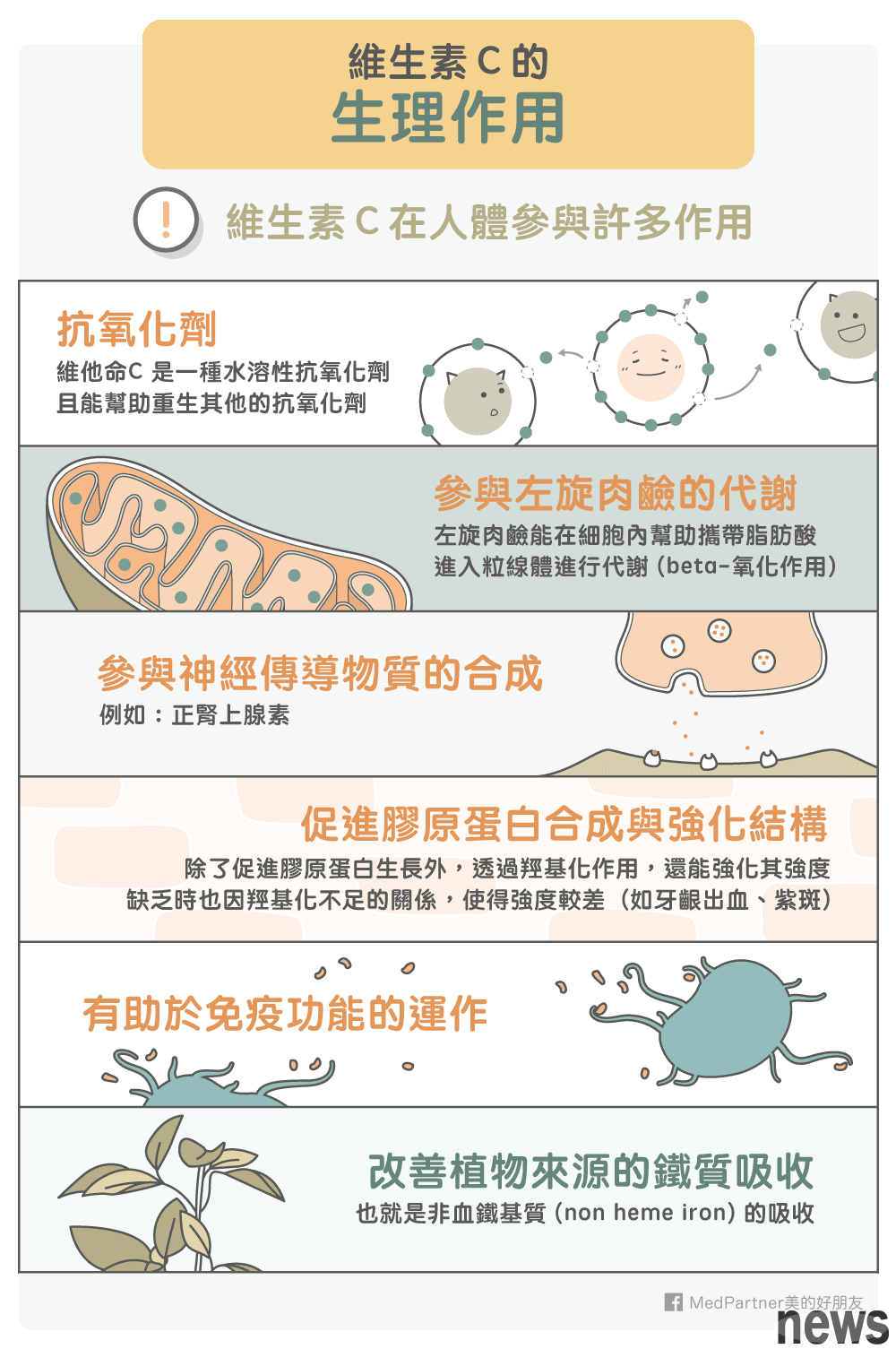
In addition to biochemical synthesis and antioxidant effects, vitamin C also helps the operation of immune function, and can also improve the iron absorption of plant sources, that is, the absorption of non-heme iron. There are really many physiological functions! But how is vitamin C absorbed and praised in its body? Let us continue watching.
Vitamin C, whether taken from natural food or nutrient supplements, as long as it is taken orally to various forms of vitamin C, it is absorbed and utilized by the human body, and the concentration of vitamin C in the blood and tissues, and the concentration of vitamin C in the bloodstream and tissues, and has a close control between each other.. For example, if 30-180 mg of vitamin C are taken per day, the kidney can absorb about 70-90%; however, when the dose of the daily dose exceeds 1 gram, the kidney absorbance rate will drop below 50%. In other words, when the intake of vitamin C is very small, the absorption rate of human beings is very good, but when the intake is large, the absorption rate will decrease. If the absorbed vitamin C is not used, it will be excreted from the urine soon.
Vitamin C after being absorbed by the kidney is generally in an oxidative form, that is, dehydroscorbic acid (DHA, simply DHA, not fatty acid) transports into the cells, and then returns to anti-aging blood acid in the cells. Since vitamin C has this recycling mechanism in the cells, only a small part of vitamin C will actually be decomposed and the daily amount of vitamin C is about 5-45 mg.
The vitamin C content in the whole body ranges from 300 mg to 2 grams. Vitamin C has a very different concentration of cells in the tissues, with higher concentrations in leukocytes, eyes, kidney and brain tissues; lower concentrations in blood and saliva (Ref. 3).
In addition, the results of drug dysfunction study indicate that the average value of the highest concentration in the blood caused by oral administration of 1.25 grams of vitamin C is 135 micromol/L, which is about twice the 200-300 mg of vitamin C taken from food every day. The drug power model predicts that even if the dose is as high as 3 grams of vitamin C every 4 hours, the maximum concentration will only reach 220 micromol/L. So it’s not that as long as you eat too much vitamin C, you can achieve an extremely high internal vitamin C concentration!
What impact does the lack of vitamin C bring to the body?
The lack of vitamin C brings to the body is mostly derived from its related physiological effects. Long-term lack of vitamin C may cause aphrodisiacs, fatigue or laziness, weakened cervical tissue and fragility of microvascular.
The initial symptoms of vitamin C deficiency may include fatigue (probably due to obstruction of carnitine synthesis), general fatigue, and dental inflammation. As the continuation of lack of the synthetic gelatin structure is damaged, making the junction tissue fragile, and may have symptoms such as ecchymosis, joint pain, difficulty in wound dysfunction, excessive keratosis, and fragility of tissue and microvascular. Leaving abusive disease without regard can be life-threatening.
In addition, vitamin C deficiency may also cause iron deficiency blood because increased bleeding and vitamin C intake deficiency affect the absorption of non-hematologic iron. In children, bone diseases may also occur.
Aphrodisiac may cause bleeding teeth, and some people may wonder if they lack vitamin C when they discover this condition. In fact, as for the living standards in Taiwan today, vitamin C is rare, but if there is poor nutrition or absorption problems due to certain reasons in the long run, there may be a lack of problems. Assume that ordinary people want to deliberately make themselves suffer from agemia, it takes several weeks to get less than 10 mg of vitamin C every day to induce the trigger. In other words, if you don’t have too many problems with your normal diet and one day you find that you have bleeding teeth, please consider whether it is periodontal disease or other oral problems first. In fact, you don’t have to worry about the occurrence of aneuryxia.
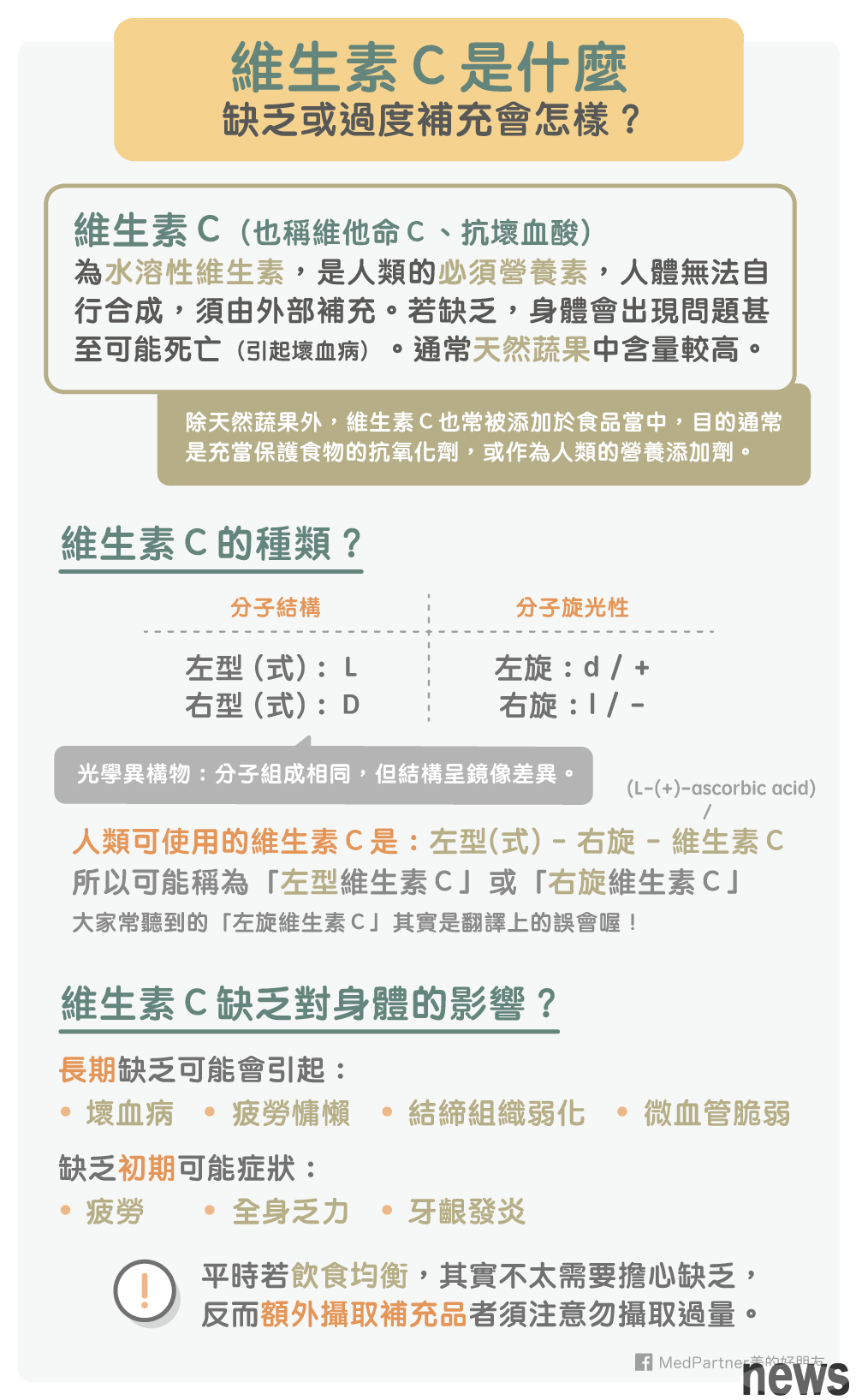
People who smoke and often contact second-hand tobacco should replenish more vitamin C, except for people with extremely uneven diet, drinking steamed or boiled milk, malabsorption or chronic diseases, people who smoke and often exposed to second-hand tobacco environment should pay special attention to replenishment of vitamin C. Research has found that the blood stasis of smokers has a lower concentration of vitamin C with white blood cells, and compared with those who do not smoke, it is partly due to the increased oxidative pressure.
For this reason, the Institute of Medicine (IOM) of the United States recommends that smokers take 35 mg of vitamin C every day than those who do not smoke. People exposed to second-hand tobacco environments will also reduce their vitamin C, but IOM has no way to recommend it to those who often contact second-hand tobacco, but in principle, these people should ensure that they can get the recommended amount that they meet.
What side effects and possible effects will be caused by excessive vitamin C?
Vitamin C are low in toxicity. Generally, it is not considered that taking too much will bring serious side effects, but taking too much may still cause the following unconditional symptoms:
●Disgusting, vomiting● Heart burning
●Esophageal inflammation
●Boral obstruction
●Stomach and fatigue
●Heart pain
●Want to sleep
●Abdominal lesions
●Insomnia
●Skin tide
Will excessive vitamin C intake cause kidney stones?
Will excessive vitamin C takeover will cause kidney stones? This is a question that many people care about. High dose of vitamin C may increase the excretion of oxalic acid in the urine, especially for people with kidney problems. Some people have found that oral vitamin C may cause kidney stones. According to a study, taking more than 2,000 mg of vitamin C orally per day for a long period of time will increase the risk of kidney stones (Ref. 4).
In 2016, there was a study on intake and kidney stone risk of diet and supplemented vitamin C. The study targeted 156,735 women in Nurses’ Health Study (NHS) and 40,536 men in Health Professionals Follow-up Study (HPFS).
The tracking time was 11.3 years and 11.7 years, and there were 6.248 cases of kidney stones. After analysis, it was found that the total vitamin C intake was significantly related to the occurrence of kidney stones in men, but not women. In addition, whether male or female, there is no relationship between vitamin C intake and risk of kidney stones (some people can take more than 700 mg of vitamin C in a day) (Ref. 5).
So the current conclusion is: don’t worry too much about the problem of stones when eating vitamin C, but if you take over oral vitamin C products for a long time (more than 2000 mg per day), you will be at risk of stones!
Vitamin C may become a pro-oxidant in some cases, which may increase oxidation damage. Some extracorporeal studies have supported that oral supplementation of vitamin C may cause chromatography and DNA damage and may contribute to cancer development by becoming a pro-oxidant agent. However, other studies have shown that taking high doses of vitamin C does not increase oxidative damage or increase cancer risk. Therefore, there may not be any benefits if the excessive amount of vitamin C is taken!
Vitamin C is often considered magical. Some friends of the natural law school often propose "extra" to supplement vitamin C can prevent or even cure cancer. The extraneous thing mentioned here refers to the use of nutrient supplements from "natural food". But what is going on in reality? Let's take a look at what the relevant research says!Cancer Prevention
The evidence of whether vitamin C in diet can affect cancer risks is still inconsistent. Most clinical studies have supported the supplemental of vitamin C, or supplementation with other nutrients, without providing any benefit to preventing cancer.
In studies in this type of study, vitamin C concentrations in the blood before or after replenishment may affect researchers' comments on the results. We mentioned earlier that the vitamin C concentration of blood and organization is closely controlled within the human body. If you take more than 100 mg of vitamin C a day, the cells seem to be finely mixed. In addition, if you take more than 200 mg a day, the blood concentration will only increase slightly. If the subject's vitamin C concentration is close to summation when entering the study, the impact of recharge may be limited, and even the difference cannot be measured.
Cancer Treatment
Research in the 1970s supported the positive benefits of high doses of vitamin C for the quality of life and survival time of patients with end-stage cancer. However, some subsequent research has not been supported. There are studies that allow patients with advanced brain cancer to replenish 10 grams of vitamin C or consolation agent every day, but there is no significant difference in the results.
New research believes that the method of vitamin C is given, oral and static injection, can also explain the contradiction between past research results. Most interventional trials only have oral trials. Oral vitamin C, even if given a large dose, can only increase the concentration in the blood to 220 micromol/L. However, with silence injection, the concentration can be increased to 26,000 micromol/L.
But is it really good to use "injection" to pull the vitamin C concentration in the blood to such a high level? During the external trial, scientists found that this high vitamin C concentration was toxic to tumor cells, and studies in mice supported that static injection of high dose vitamin C might also treat difficult tumors. High doses of vitamin C may become pro-oxidant agents, which can produce oxidation and be toxic to cancer cells. Based on these findings, there are also case reports of high dose vitamin C in patients with advanced cancer, and some researchers support the possibility of re-evaluating the possibility of high dose static injection of vitamin C in treating cancer. But what is the role of high dose vitamin C in human body? So far, there is no clear support.
Cardiovascular Disease
As the current evidence that vitamin C can prevent cardiovascular disease or related death risks cannot give a positive answer.
The changes in the elderly and cataracts
Doesnthetic changes in the elderly and cataracts
Doesnthetic changes in the elderly and cataracts
Doesnthetic changes in the elderly and cataracts
Doesnthetic changes in the elderly and cataracts
Doesnthetic changes in the elderly and cataracts
Doesnthetic changes in the elderly and cataracts
Doesnthetic changes in the elderly and cataracts
Doesnthetic changes in the elderly and cataracts
Doesnthetic changes in the elderly and cataracts
Doesnthetic changes in the elderly and cataracts
Doesnthetic changes in the elderly and cataracts
Doesnthetic changes in the elderly and cataracts
Doesnthetic changes in the elderly and cataracts
Doesnthetic changes in the elderly and cataracts
Doesnthetic changes in the elderly and cataracts
Doesnthetic changes in the elderly and cataracts
Doesnthetic changes in the elderly and cataracts
Doesnthetic changes in the elderly and cataracts
Doesnthetic changes in the elderly and cataracts
Doesnthetic changes in the elderly and cataracts
Doesnthetic changes in the elderly and cataracts
Doesnthetic changes in the elderly and cataracts
Doesnthetic changes in the elderly and cataracts
Doesnthe
Common Cold
Although data shows that supplementing Vitamin C with more than 200 mg per day can reduce the seriousness and cycle of colds, the ideal way is to get this amount from your daily diet. The reason is that if vitamin C is taken from supplementary products, it will not reduce the overall cold incidence rate of ordinary people.
For whom may be helpful to take Vitamin C from supplementary products? What the current study agrees is that those who are more likely to lack vitamin C or those who are more prone to lack of high activity pressure and smokers may receive some help.
Overall, the results of the published research still lack consistency, and more research is needed in the future to determine how much dose of vitamin C may be used for treatment (Ref. 6).
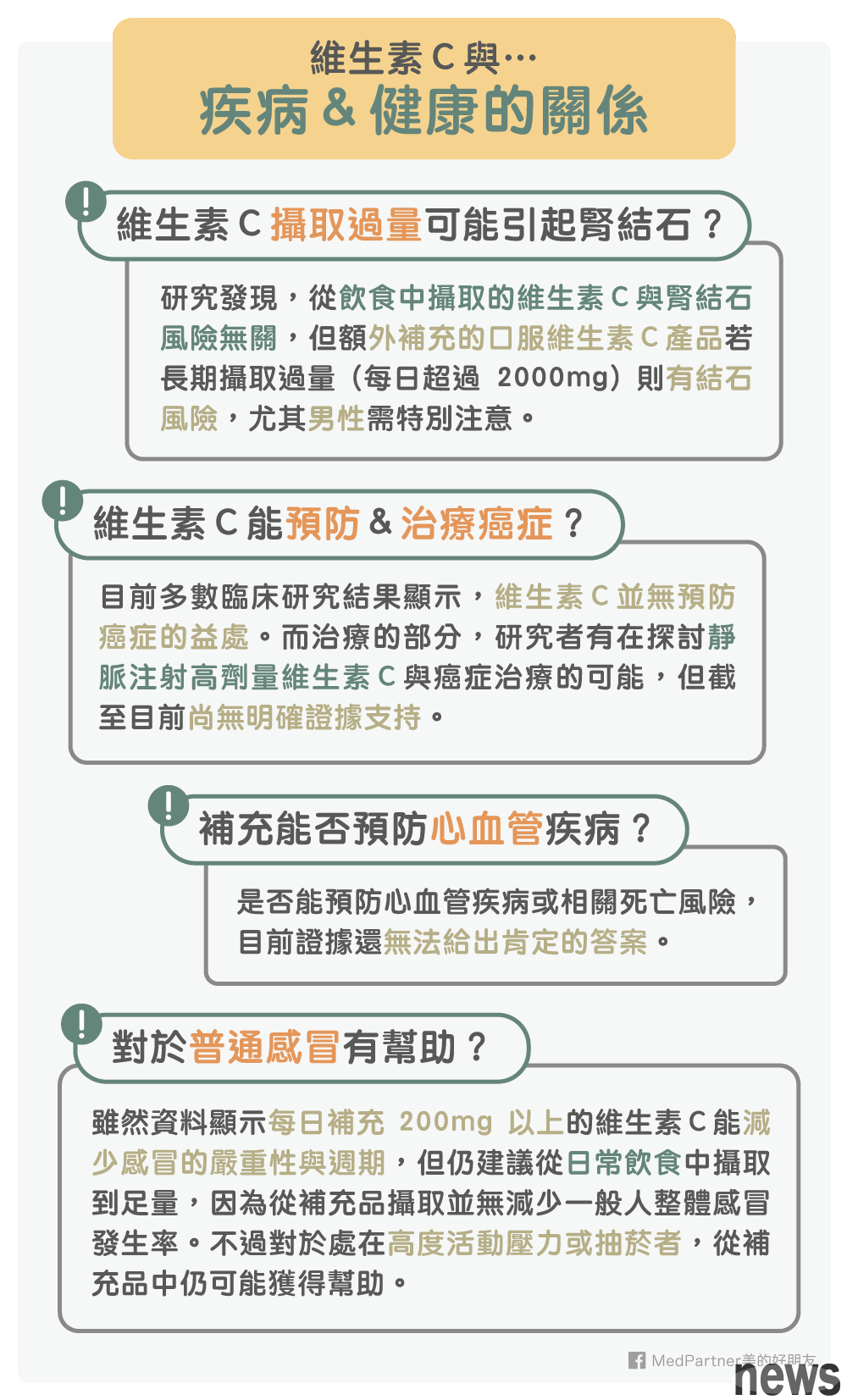
After talking about the merging, absorption and relationship with disease and health of this multivitamin C, how should I eat Vitamin C? How much should I eat? Below we have compiled relevant information and made a table for your reference.
Vitamin C recommended consumption
How much vitamin C should ordinary people take in a day? To avoid vitamin C intake deficiency and overdose, please refer to the Ministry of Foreign Affairs and Health and Health to provide suggestions for nationals (below).
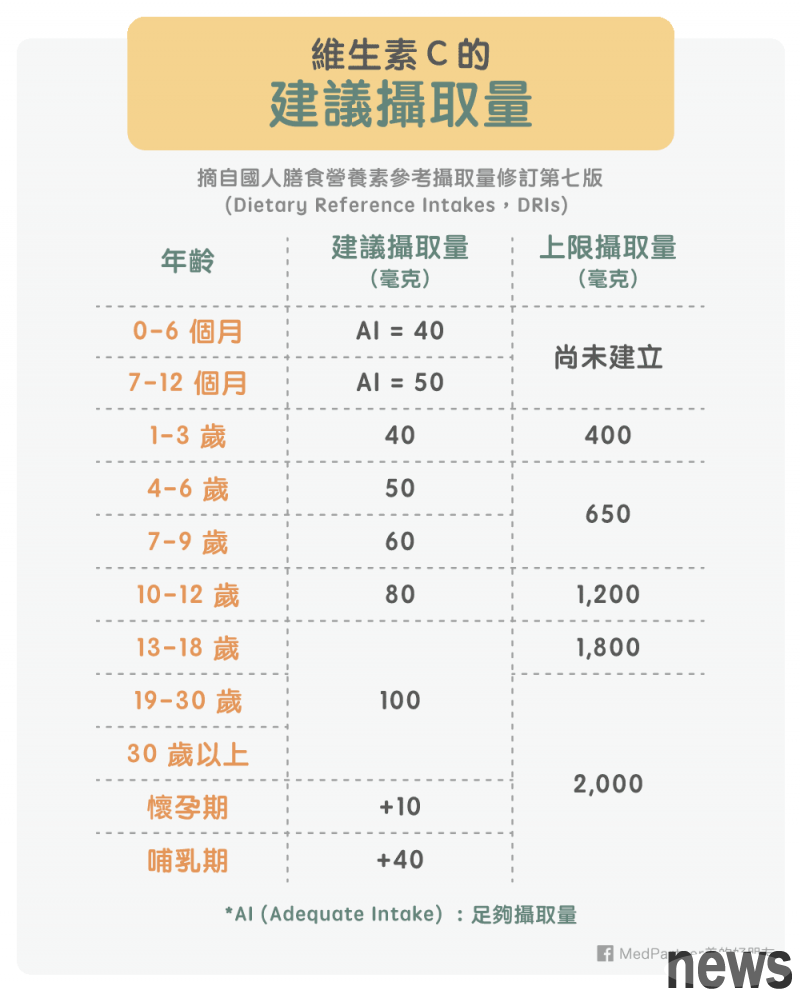 Vitamin C in food is the best source of vitamin C. Citrus fruit is a good choice, and bell peppers, green cauliflower, strawberries and cantaloupe are also good sources.
Vitamin C in food is the best source of vitamin C. Citrus fruit is a good choice, and bell peppers, green cauliflower, strawberries and cantaloupe are also good sources.
But there is a little reminder that foods containing vitamin C may be reduced due to longer periods of time. In addition, water will be lost or heat-damaged during cooking. Cooking by steaming or short-time microwave can reduce loss.
If you can follow the daily dietary guidelines, just eat five different types of fresh fruits and vegetables a day and you can eat more than 200 mg of vitamin C, which can easily meet the recommended daily intake. The following indicates a list of commonly found foods rich in vitamin C. If you look carefully, you may think that if there is a food, is it wrong? Why does sliced ham (beef) contain so many vitamins? Hey, we didn't make a mistake, it does have a high vitamin C, but that is added as an antioxidant.
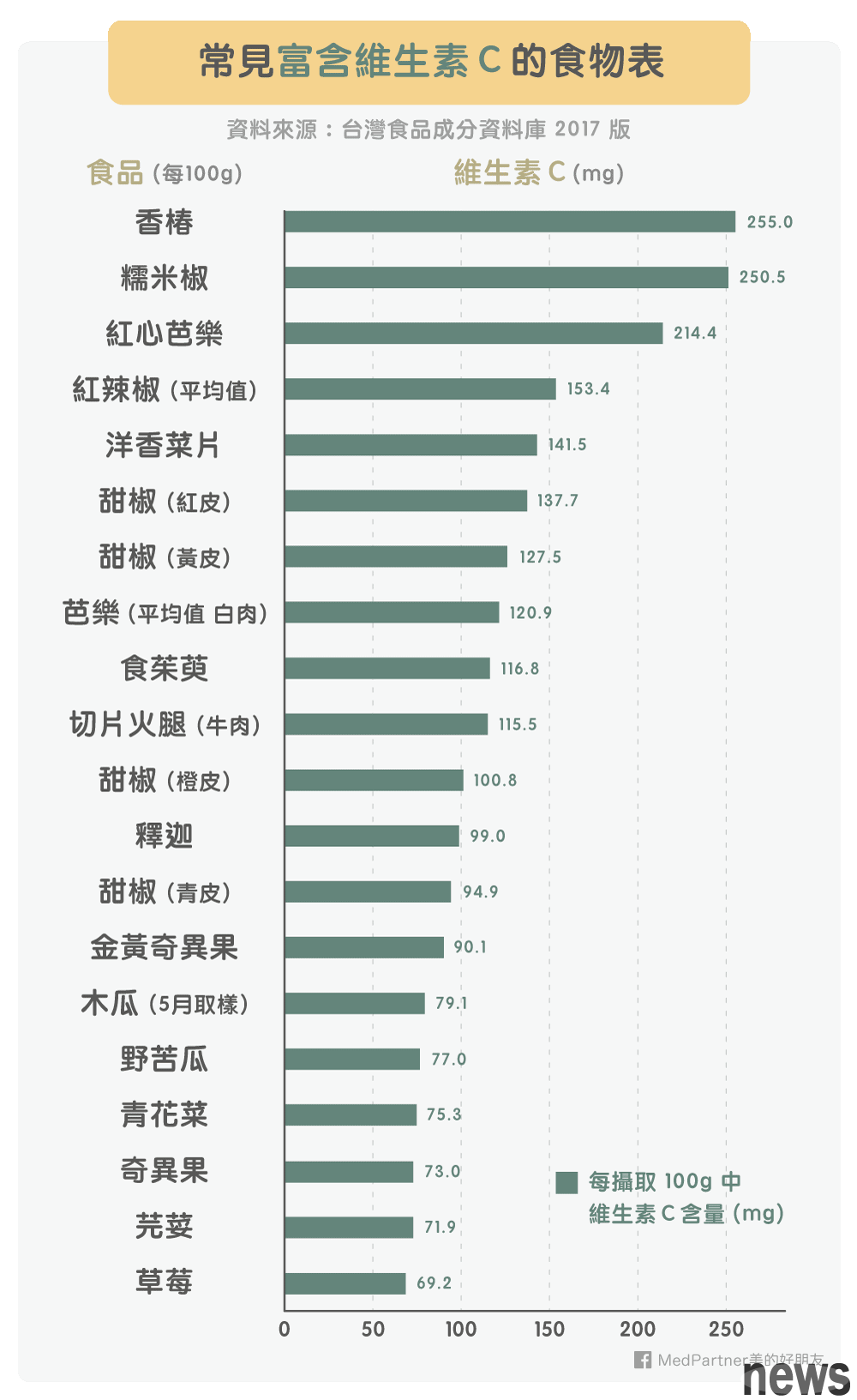
Vitamin C supplement selection and precautions
Anti-abortional acid, Sodium Ascorbat e, Calcium Ascorbate, L-Ascorbyl Stearate, and L-Ascorbyl Palmitate … etc. are all vitamin C that may be added to food. However, regardless of which one is used, the total daily vitamin C intake should not be higher than 1,000 mg in foods with daily consumption or 300 grams.
In addition to the commonly seen vitamin C, there are also some special vitamin C on the market, such as esterified C or bio-keto C (combined with vitamin C, citrus bio-keto and plant lipids), which all claim that bioavailability is better than normal vitamin C. There has been research on whether esterified vitamin C and anti-oxidant acid have different effects on internal concentration. It was found that after replenishment, the two had the same blood concentration. However, for those who replenished lipidized vitamin C, the concentration of vitamin C in white blood cells is significantly higher. Generally speaking, the price of C esterified or other special types is higher, and it depends on your choice.
Interaction between vitamin C and drugs
Taste Vitamin C supplements may interact with certain drugs. Here are some examples for your reference. If you meet the following situations, remember to ask your doctor before replenishing.
AxTaste Vitamin C increases your altitude from aluminium-containing drugs, such as phosphoric binders.
Chemistry
Using antioxidants such as vitamin C during the chemotherapy may reduce the effect of the drug. Taking
estrogen
vitamin C together with oral contraceptives or hormone replacement methods is likely to increase the estrogen concentration in your body.
Protease inhibitors (antiviral drugs)
Taking vitamin C may reduce the effect of this drug
Anticoagulant drugs (Warfarin)
Taking high doses of vitamin C may reduce the body's reaction to anticoagulants.
I believe that after seeing this, you should have a full-length understanding of Vitamin C.. The MedPartner team’s advice on filling, I hope you can eat at least five servings of vegetables and fruits every day. As long as you can do this, you can get a lot of vitamin C! As for whether the additional vitamin C supplement is suitable for you, please return to the text and evaluate your condition carefully. Is it really necessary!
Reference1.NIH – Office of Dietary Supplements – Vitamin C
2.Chatterjee, I. B., Majumder, A. K., Nandi, B. K., & Subramanian, N. (1975). Synthesis and some major functions of vitamin C in animals. Annals of the New York Academy of Sciences, 258(1), 24-47.
3.Jacob, R. A., & Sotoudeh, G. (2002). Vitamin C function and status in chronic disease. Nutrition in clinical care, 5(2), 66-74.
4.Mayo Clinic – Vitamin C
5.Ferraro, P. M., Curhan, G. C., Gambaro, G., & Taylor, E. N. (2016). Total, dietary, and supplemental vitamin C intake and risk of incident kidney stones. American Journal of Kidney Diseases, 67(3), 400-407.
6.Bucher, A., & White, N. (2016). Vitamin C in the Prevention and Treatment of the Common Cold. American Journal of Lifestyle Medicine, 10(3), 181-183.
7.Mayo Clinic – Vitamin C
This article is authorized to be reprinted by "MedPartner Beautiful Friends", and the original article is published here